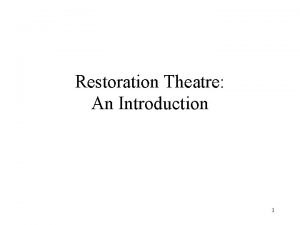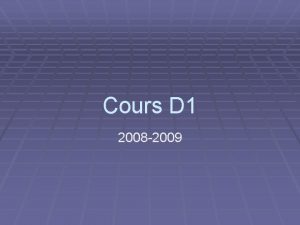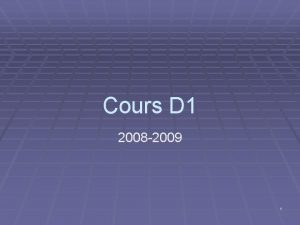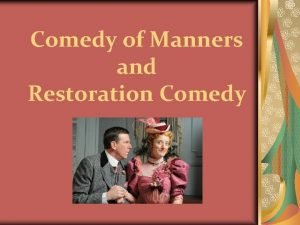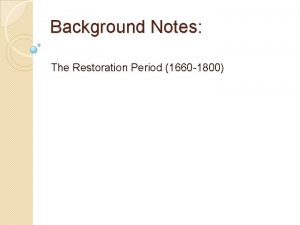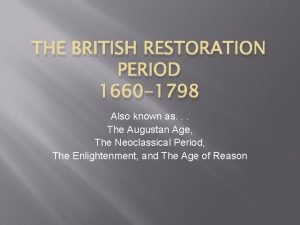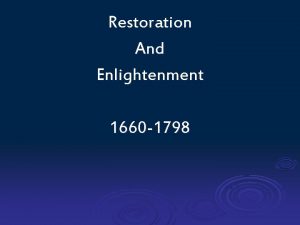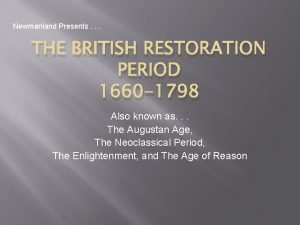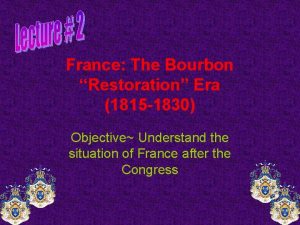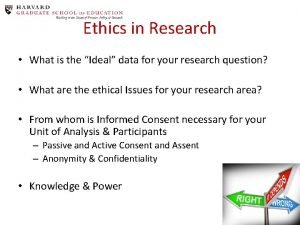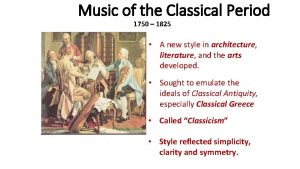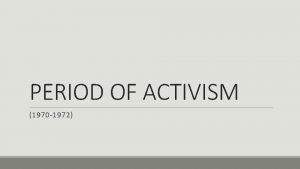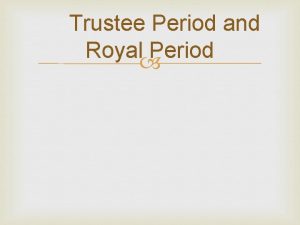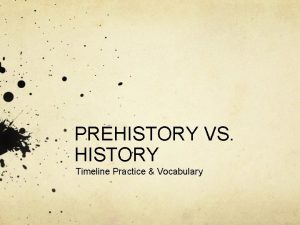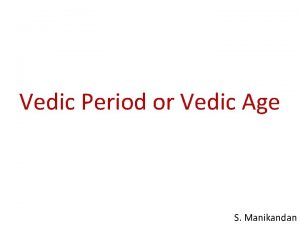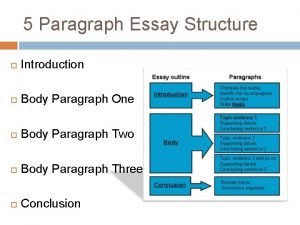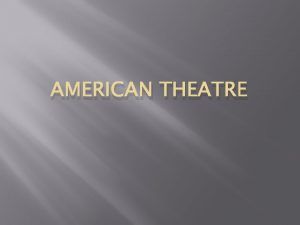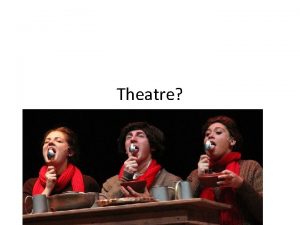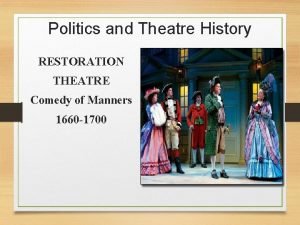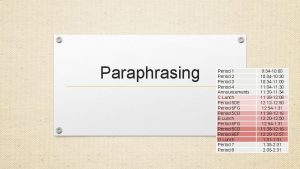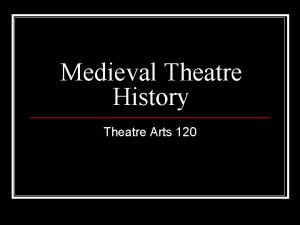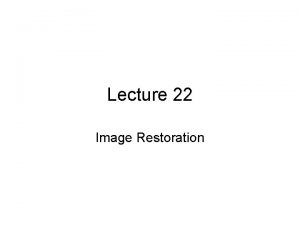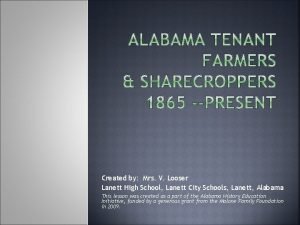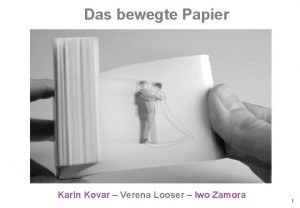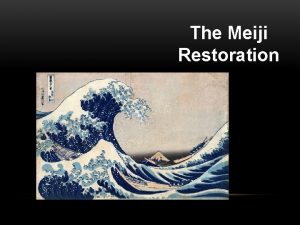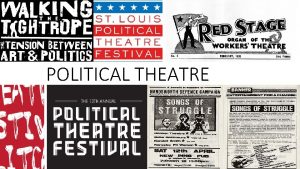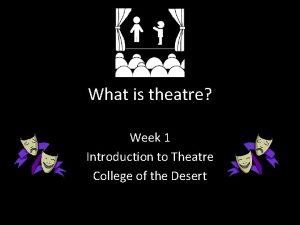Restoration Theatre An Introduction 1 Restoration Period Looser




























- Slides: 28

Restoration Theatre: An Introduction 1

Restoration Period • Looser morals • Puritans banned theatre in 1642, and also many folk rituals like Maypole dancing • Restoration is 1660, when Charles regained the throne after the Commonwealth and Protectorate, but Restoration drama generally refers to drama written between then and about 1700. 2

Restoration Literature • Deals with sexual matters • John Wilmot, Earl of Rochester • Frank and free exploration of sexual mores and behaviour • Comedy prevails in period between Charles’s Restoration and the advent of sentimental comedy at the beginning of the 18 th Century • But also plenty of heroic tragedy 3

Restoration Comedy • Also known as artificial comedy or comedy of manners • Presents a society of elegance and stylishness • Social codes of middle and upper classes • Witty, urbane and sometimes licentious • Intricacies of sexual and marital intrigue – therefore also with adultery and cuckoldry 4

Conditions of Restoration Theatre • New Restoration companies issued with patents and patronage by Royal personages (1660) • King’s Men: granted playing rights under Charles’s own patronage, under the control of Thomas Killigrew • Duke’s Men: patronage of the Duke of York, under the control of William Davenant 5

Restoration Theatres • Tennis courts to start with – net line divided the audience (c. 400) from the players • 1663: Killigrew moved King’s Men to a disused riding school in Drury Lane 1674: purpose-built Theatre Royal, Drury Lane • 1671: Davenant moved the Duke’s Men to purpose -built Duke’s Theatre, Dorset Garden, 6

Killigrew/King’s Company 1660: Gibbons’s Tennis Court in Vere Street 1663: Killigrew moved King’s Men to a disused riding school in Drury Lane 1672: It burnt down. 1674: purpose-built Theatre Royal, Drury Lane Back to Immediate Context 7

Davenant/Duke’s Company 1661: Lisle’s Tennis Court in Lincoln’s Inn Fields (Betterton and Co. acting in Cockpit until Davenant moved them here) 1671: Davenant moved Duke’s Men to purpose-built theatre in Dorset Garden. 1682: Companies were united, under actor/manager Betterton. Back to Immediate Context 8

Purpose Built Theatres • Staging scenery – perspectival views • Davenant and John Webb (set designer) first employed this in The Siege of Rhodes (1656) • Painted backgrounds on back wall of stage and moveable flat shutters which fitted into grooves which could be drawn across the stage • Covered stage and auditorium lit by windows above the stage, the light supplemented by candles • Apron stage – actor in close proximity to audience 9

10

Dramaturgical Points • Actors and actresses typecast • Married couples often played in the same play • Characters moved from play to sequel played by same actors, even when sequel by difference playwright • Interplay between stage and audience not confined to asides – caricaturing of well-known real people does occur. Is Dorimant the Earl of Rochester? 11

Actresses! • In France actresses already played female parts • Better to have women playing women rather than men dressing up as women • Actresses also high-class prostitutes to supplement their income • ‘Restoration actresses brought sexuality to the stage in a palpable, though hardly in a more realistic, way’ J. L. Styan 12

Sex Scenes • Rare in early modern drama – City comedy and Romeo and Juliet don’t play for the sex • The Relapse: Loveless unceremoniously bundles Berinthia into a cupboard • The Man of Mode: Bellinda and Dorimant explicit scene • Opportunities for female nudity these scenes offered 13

Night-gowns and breeches • Women in state of undress for bed • Women dressed as boys (so you can see their legs) • Devices to show the actresses’ bodies off 14

Immediate Context of 1675 -6 • Aftermath of 3 rd Dutch War • Anti-French sentiment • Theatrical history: Mo. M for the Duke’s Company click. • So, what is the immediate context of production of the plays? • Can we identify particularly clever staging effects in The Man of Mode? 15

Restoration Theories of Comedy • ‘For, as Aristotle saies rightly, the moving of laughter is a fault in Comedie, a kind of turpitude, that depraves some part of a mans nature without a disease’ Ben Jonson • Classical theories very important to writers of Restoration drama; also what Jonson and Shakespeare (might have) thought was discussed and reused. • Satire (moving forward to Swift) – Fletcherian Romantic Comedy – comedy of humours (Shadwell) 16

Crucial Questions • What did Restoration playwrights think comedy should be? • How did they relate their efforts to the dramas of the ‘last age’? • What were their purposes in writing comedies the way they did? 17

Is Dorimant the Earl of Rochester? The Country Wife III. ii: Spa. ‘They’ll put a man into a Play for looking a squint: Their predecessors were contented to make servingmen only their Stage-Fools, but these rogues must have Gentlemen…nay, Knights. ’ Dor. ‘Blame’em not, they must follow their Copy, the Age’. 18

Dorimant and Waller • Looking back to the ‘good old days’? Historical nostalgia a feature of the period. • Tracing your literary ancestors is an important political act. • Lady Woodvil and Master Courtage in IV. i: ‘Forms and ceremonies, the only things that uphold Quality and greatness, are now shamefully laid aside and neglected. ’ (ll. 20 -22) 19

Problems • Almost impossible to construct a coherent theory of comedy from Restoration practice, even when combined with theories • Critics have very different ideas about what each play shows • Playwrights keep changing their minds 20

Aphra Behn (Preface to The Dutch Lover (1673)) • ‘Recent plays have been as effective as recent sermons have been in improving the morals and the wit of their respective audiences’ • She claims no playwright ever wrote with the aim of improving the morals of the audience • Comedy was never meant ‘either for a converting or a conforming ordinance’ 21

Aphra Behn (Dedication to The Lucky Chance (1687)) • Plays are ‘secret instructions to the People, in things tis impossible to insinuate to them any other way…Tis example alone that inspires Morality, and best establishes Vertue. ’ 22

William Congreve, Amendments to Mr Collier’s False and Imperfect Citations (1698) • ‘Comedy (says Aristotle) is an Imitation of the worst sort of people…in respect to their Manners…They must be exposed after a ridiculous manner: For Men are to be laugh’d out of their Vices in Comedy’ • Sir Richard Blackmore (1695) ‘The business of comedy is to render Vice ridiculous, to expose it to publick Derision and contempt, and to make Men ashamed of Vile and Sordid actions’ 23

Types of Restoration Comedy • Low, crudely instructive ‘comedy of humours’ • Gay, witty, refined ‘comedy of manners’ 24

Quintilian • Urbanitas: the language of the cities and of learning • Venustus: graceful, charming • Salsus: salty, piquant • Facetus: polished, elegant 25

Mixed Comedy • ‘These are those which are neither all wit, nor all humour, but the result of both. Neither so little of humour as Fletcher shows, nor so little of love or wit as Jonson; neither all cheat, with which the best plays of the one are filled, nor all adventure, which is the common practice of the other. ’ Dryden 26

Repartee • The verbal equivalent of the struggle for sexual and mental superiority between these two characters in any of the comedies – it figures in words what they experience in fact • Dryden: ‘as it is the very soul of conversation, so it is the greatest grace of comedy, where it is proper to the characters. There may be much of acuteness in a thing well said; but there is more in a quick reply “for wit always looks more graceful in reply than in attack. ”’ 27

Theorising Comedy Aphra Behn: ‘I think a play the best divertissement that wise men have: but I do also think them nothing so important as those who do discourse as formally about the rules of it, as if twere the grand affair of human life. ’ 28
 What is restoration theatre
What is restoration theatre Estrias de looser-milkman
Estrias de looser-milkman Strie looser milkman
Strie looser milkman Strie de looser milkman
Strie de looser milkman Benjamin looser
Benjamin looser Restoration comedy comedy of manners
Restoration comedy comedy of manners 1800 background
1800 background Puritan age in english literature
Puritan age in english literature The restoration period
The restoration period The restoration refers to
The restoration refers to Newmanland
Newmanland Restoration period france
Restoration period france Romantic theater
Romantic theater Critical period vs sensitive period
Critical period vs sensitive period A&p flix activity: generation of an action potential
A&p flix activity: generation of an action potential When is the relative refractory period
When is the relative refractory period Critical period vs sensitive period
Critical period vs sensitive period Critical period vs sensitive period
Critical period vs sensitive period Critical period vs sensitive period
Critical period vs sensitive period 1750 music
1750 music What element is nonmetal halogen family atomic mass 35
What element is nonmetal halogen family atomic mass 35 Period activism
Period activism Stability period vs measurement period
Stability period vs measurement period Trustee period and royal period
Trustee period and royal period Ce vs ad
Ce vs ad The staple food of the vedic aryans was-
The staple food of the vedic aryans was- Introduction paragraph structure
Introduction paragraph structure Anti shock trousers
Anti shock trousers Oswald's restoration theory of sleep
Oswald's restoration theory of sleep
